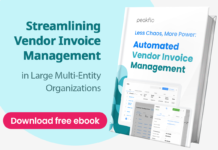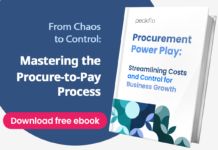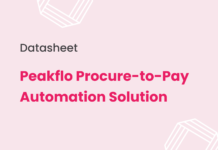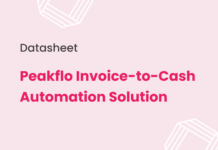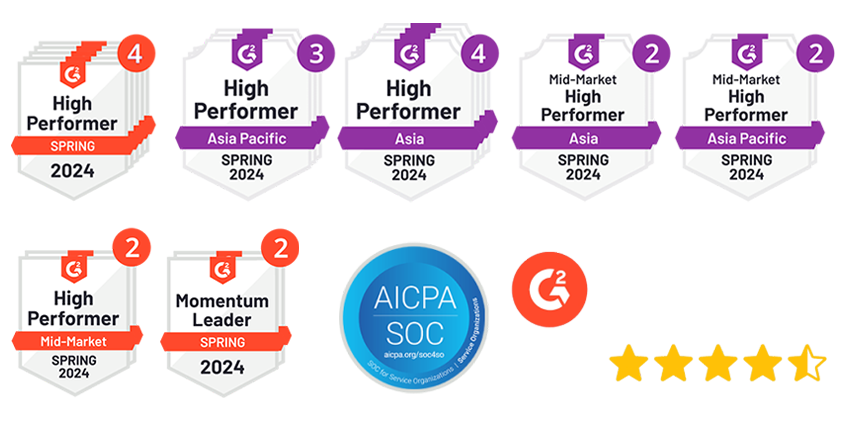Managing accounts payable (AP) can feel like juggling too many tasks simultaneously. You must stay on top of invoices, approvals, payments, and vendor queries while ensuring you do not overspend or miss deadlines. If your team is still handling AP manually, you are not just losing time but exposing the business to errors, fraud, and missed payment discounts.
But here is the thing: there is no one-size-fits-all solution. You have probably heard about AP outsourcing and AP automation, two strategies that claim to streamline your AP processes. But how do you decide which is best for your company? That is what this post is about. We will break down the pros and cons of both approaches so you can make an informed decision that matches your business needs.
By the end, you will have clarity on which approach—outsourcing or automation—can help you boost efficiency, minimize risks, and maintain control over your payables.
Let’s first gain a basic understanding of Accounts Payable Outsourcing.
Understanding Accounts Payable Outsourcing
Outsourcing accounts payable (AP) might sound like a bold move, but it’s becoming a game-changer for many businesses. Why? It hands over one of the most critical functions, which include processing invoices, scheduling payments, and handling vendor communications. Let us dive into how outsourcing can supercharge your AP operations.
- Transfer of Full Responsibility
When you outsource, the AP process is no longer on your plate. The third-party provider takes full charge of processing invoices, scheduling payments, and managing vendors. This shift frees up your internal resources while ensuring every detail is handled precisely.
- Efficient Invoice Processing
Manual invoice entry leaves room for error. With outsourcing, the provider validates, processes, and tracks invoices. This minimizes mistakes and boosts accuracy. Your team saves time and focuses on more strategic tasks while the outsourcing firm keeps everything running smoothly.
- Vendor Management
Strong vendor relationships are vital for a seamless AP process. When you outsource, vendor communication is expertly handled for you. The third-party provider handles inquiries and payment schedules, ensuring timely payments and maintaining good standing with suppliers.
Common Reasons for Outsourcing
Account payable management needs thorough monitoring and accuracy. These are the two most important factors. Having in-house experts could be a very costly endeavor. So, the answer is outsourcing. Let us get a brief understanding:
- Reducing Workload
Managing a high volume of invoices can overwhelm internal teams. By outsourcing, you ease the pressure on your staff and reduce administrative costs, allowing your team to focus on high-value tasks.
- Gaining Expertise
Outsourcing provides access to experts who specialize in accounts payable. They are familiar with the latest tools and techniques, ensuring your processes are efficient and compliant.
Industries That Benefit from Outsourcing
Be it a small business, a large enterprise, or a startup – any type of business can reap the benefits of AP outsourcing. Let us look at it briefly:
- Small and Medium Businesses
SMBs often lack the resources to maintain an entire AP team. Outsourcing provides them with an affordable solution while still maintaining high standards.
- High-Transaction Industries
Retail, hospitality, and similar industries process many invoices daily. Outsourcing helps them manage this volume while keeping costs under control.
- Growing Businesses
As companies grow, managing accounts payable becomes more complex. Outsourcing scales with your business, providing flexible support as you expand.
Example: Peakflo helped Qoala save 42.5 man-hours per month by automating its accounts payable process. This includes 24.5 hours saved by streamlining approvals and communications, 9 hours from AI-powered invoice capture, and 9 hours by automating disbursements. They also reduced invoice approval times to 4 hours, speeding up processing and freeing the finance team to focus on higher-value tasks.
Read the full story here.
Pros and Cons of Choosing Accounts Payable Outsourcing
Let us break down the pros and cons of Accounts Payable (AP) outsourcing to understand its implications better:
Pros of Accounts Payable outsourcing
| Reduced Overhead | By outsourcing AP, companies can avoid the costs of maintaining an in-house team. This includes salaries, benefits, training, and office space for AP staff. |
| Expertise | Outsourcing firms typically specialize in AP processes. They stay up-to-date with best practices, regulations, and technologies, potentially offering higher quality service than an in-house team. |
| Simplified Operations | Outsourcing AP allows a company to focus on its core business activities without the distraction of managing day-to-day AP tasks. |
Cons of Accounts Payable Outsourcing
| Loss of Control | When AP is handled externally, the company has less direct oversight of the payment process. This can make some organizations uncomfortable, especially regarding sensitive financial information. |
| Risk of Errors | While outsourcing firms are often experts, they are not foolproof. There is still a risk of mistakes or fraud, which could be caught more quickly with in-house processing. |
| Dependence on Vendor | The quality of AP processing becomes tied to the outsourcing firm’s performance. If the vendor underperforms or goes out of business, it could significantly disrupt the company’s operations. |
| Data Privacy | Outsourcing means giving your financial data to another company. This can lead to unauthorized access or misuse of that data. |
| Security Concerns | When vendors handle your financial information, the risk of hacking or data breaches goes up. Make sure the company you outsource to has strong security measures to protect your data. |
Understanding AP Automation
AP automation means using technology to manage repetitive tasks like invoice processing, payment approvals, and tracking. It replaces manual steps with automated workflows, giving businesses faster and more accurate ways to handle accounts payable.
The key features of AP Automation include:
- Integration with Accounting Systems: Automation software connects easily to your existing accounting systems. It ensures that all your financial data is synced in real time, reducing errors from manual entry. This integration ensures that your records stay current without extra work from your team.
- Data Analytics and Insights: AP automation tools provide real-time reports on payments, vendor performance, and cash flow. This data helps finance teams make better decisions. With these insights, you can see where the process slows down and fix problems quickly.
- Automated Invoice Processing: Automation speeds up invoice processing. Tools like OCR (optical character recognition) scan invoices, read the data and send them for approval without manual steps. This means fewer mistakes and faster payments.
Common Reasons for AP Automation
AI is reshaping the business modules in all sectors – transforming how we manage business finance. Account payable automation can put your business on the front row. Let us tell you how:
- Scaling with Business Growth
As businesses grow, handling accounts payable manually becomes too slow and costly. AP automation lets you process more invoices without adding new staff, helping your business grow without extra costs.
- Fewer Errors, More Efficiency
Manual processes lead to mistakes, like missing payments or duplicate entries. With automation, these errors are less likely to happen. The system works quickly and accurately, letting your team focus on more critical tasks.
Industries That Benefit from Automation
AP Automation can transform multiple industries, such as logistics and e-commerce. The primary job of AP automation is to simplify your end-to-end payment cycle. Let us learn further:
- Large Companies with Many Invoices
Industries like retail, healthcare, and manufacturing process thousands of monthly invoices. Automation helps manage this load quickly, reducing the time spent on each invoice and cutting costs.
- Companies with Complex Payments
Businesses that work with many vendors or handle international payments benefit from automation. It keeps track of different currencies, ensures compliance, and simplifies the payment process for multiple vendors.
Example: Peakflo helped Rey.id by automating their accounts payable (AP) process, significantly reducing manual data entry, and automating approval workflows. They cut bill approval time from 3 days to 3 hours and reduced the budget management process from one month to just one hour. These improvements saved Rey.id 210 man-hours per month, boosting their operational efficiency and giving their finance team more time for strategic tasks.
Read the full story here.
Pros and Cons of AP Automation
Let us dive into the world of AP Automation and explore what it means for modern businesses.
Pros of AP Automation
| Increased Efficiency | AP Automation speeds up invoice processing and approval cycles. What once took days or weeks can now be accomplished in hours or even minutes, allowing businesses to operate at lightning speed. |
| Cost Savings | By eliminating many manual tasks, AP Automation significantly reduces labor costs. This not only saves money but also frees up staff to focus on more strategic, value-adding activities. |
| Better Cash Flow Management | With real-time visibility into payables and cash flow, businesses can make more informed financial decisions. This transparency can be a powerful tool for optimizing working capital and maintaining healthy supplier relationships. |
| Scalability | As businesses grow, AP Automation easily adapts to increasing invoice volumes without the need for additional staff. This scalability ensures that AP processes can keep pace with business expansion. |
Cons of AP Automation
| Upfront Costs | Implementing AP Automation software often requires a significant initial investment. While the long-term benefits can be substantial, the upfront costs can be a hurdle for some businesses, especially smaller ones. |
| Learning Curve | Transitioning to a new system inevitably comes with a learning period. Employees need time to adapt to the new processes and technology, which can temporarily impact productivity. |
| Integration Challenges | Existing systems and workflows may need modifications to integrate seamlessly with new AP automation software. This can be complex and time-consuming, potentially disrupting the implementation phase. |
Comparing AP Outsourcing and AP Automation
Choosing between outsourcing and automation is not always straightforward when transforming your accounts payable. Both options promise to make your AP processes more efficient but impact cost, control, scalability, and efficiency differently.
1. Cost Implications: Ongoing Fees vs. Long-Term Savings
With AP outsourcing, you pay someone else to manage your processes, which comes with ongoing fees. You will be charged monthly for invoice processing, payment scheduling, and vendor management. For some, this is a convenient trade-off for reduced workload. However, those fees never go away.
On the other hand, AP automation requires an upfront investment. The initial cost may seem hefty, but the value lies in the long-term savings. Once you implement automation, your team spends less time on repetitive tasks, reducing labor costs. Over time, automation becomes the more cost-effective option as your company grows.
2. Control and Visibility: Do You Prefer Transparency or Delegation?
Outsourcing takes accounts payable (AP) tasks off your hands, but you also give up some control. When a third-party company handles your AP, you lose direct oversight of payment schedules and vendor interactions. This can be uncomfortable, especially when you need real-time information to make decisions.
On the other hand, AP automation keeps everything within your team’s control. It gives you complete visibility into every transaction. Automated dashboards show real-time data, so you can quickly track cash flow, check unpaid invoices, and address issues. It is like having a clear view of your AP process without the need to monitor it constantly.
3. Scalability: Growth Without Growing Pains
As your business expands, the volume of invoices and vendors grows, too. Outsourcing can handle this surge, but it comes with its challenges. You may be locked into rigid service agreements or face delays as your outsourcing partner adjusts to your changing needs.
With automation, scalability is built-in. As the number of invoices grows, the system scales effortlessly without additional overhead. You will not need to renegotiate contracts or worry about third-party delays. Whether you are processing 100 or 1,000 invoices monthly, automation ensures a smooth process.
4. Efficiency: Delays vs. Real-Time Speed
Both approaches prioritize efficiency, but their methods differ in achieving it. Outsourcing can introduce delays, mainly when relying heavily on third-party service providers. If you need an urgent adjustment or have time-sensitive payments, waiting for an external team can slow you down.
In contrast, AP automation is designed for speed. It streamlines real-time invoice approvals, payment processing, and real-time error detection. Automated workflows mean you no longer have to chase approvals or worry about delayed payments. Your team can make faster, data-driven decisions and keep cash flow moving.
5. Error Detection Leading to Overpayment
Manual handling can lead to errors, including overpayments, in outsourcing. When relying on third-party vendors, mistakes may not be caught right away.
AP automation, however, detects errors instantly. It flags issues in real-time to avoid overpayments. This gives your team more control and helps reduce financial loss.
6. Detecting Duplicate Invoices
Outsourcing can make it challenging to spot duplicate invoices. This may result in double payments. The third-party vendor might miss these duplicates during their review.
On the other hand, AP automation scans invoices automatically. It flags duplicates before any payments are made. This prevents costly errors and keeps your financial system running smoothly and securely.
4 Factors to Consider When Choosing Between Outsourcing and Automation

Choosing between outsourcing and automation for your accounts payable depends on various factors. Your company’s size, financial goals, and growth plans all play a role. Let us look at the five key factors you should consider.
1. Company Size and Resources
Small businesses often do not have enough staff to handle accounts payable efficiently. Outsourcing can help by giving the work to a third party. But if your company has some internal resources, automation might be better. Automation lets your team handle more work without hiring new staff.
Larger companies that can afford an upfront investment might prefer automation. It offers better control and can easily handle larger workloads.
2. Financial Strategy
Are you looking for a short-term fix or a long-term solution? Outsourcing is cheaper initially—you pay a regular fee for the service—but automation saves more money in the long run. It costs more to set up but reduces labor costs over time by improving efficiency.
Automation is the better choice for saving money in the long run. It also helps manage cash flow better by speeding up payments.
3. Scalability Needs
As your business grows, the volume of invoices will increase. Outsourcing can handle this growth but may come with extra fees or limited flexibility.
Automation, however, scales smoothly. It can process more invoices without extra costs or the need for additional staff, making automation ideal for businesses that expect growth.
4. Operational Efficiency
Operational efficiency is not just about speed but how well you use your resources and manage processes.
Outsourcing accounts payable moves everyday tasks to an outside company. This frees up your team to focus on bigger projects. However, relying on an external partner can create dependency. If workflows do not align or communication breaks down, it can disrupt your operations and require extra management.
In contrast, automation enhances internal efficiency by keeping all processes in-house and under your control. Automated AP systems allow your existing team to handle larger volumes of work without adding more staff.
Let us see how Peakflo takes automation to the next level, transforming accounts payable with cutting-edge AI technology.
Peakflo Transforms Accounts Payable with AI-Powered Automation
Peakflo’s AP Automation Solutions are designed to make managing accounts payable easier. Here is how Peakflo stands out:
- AI-Powered Invoice Capture: Peakflo scans and verifies invoices. It uses OCR technology, which reduces manual work. It also supports 41 languages, making it great for global businesses.
- Custom Field Mapping and 3-Way Matching: Peakflo lets you organize invoices by custom fields. It also checks invoices against purchase orders and receipts, preventing overpayments and missing items.
- Automated Approval Workflows: You can set up different approval levels based on invoice amounts or departments. This speeds up the approval process and keeps everything transparent.
- Automated Reconciliation: Peakflo automatically matches payments with invoices. It flags problems and helps you fix them. Automatic reconciliation and disbursement save time during month-end closing and keep records accurate.
You can take a product tour anytime to learn more about our AP solutions.
Conclusion
Both accounts payable outsourcing and AP automation offer benefits and challenges. Outsourcing reduces in-house workload but may limit control, while automation provides greater accuracy and efficiency with an upfront investment. Your choice depends on your company’s size, growth plans, and need for scalability.
Are you curious to see which option best fits your business? Talk to our experts to explore how you can streamline AP processes!


















